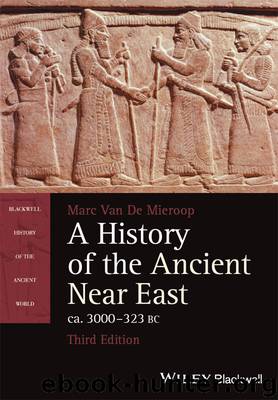A History of the Ancient Near East, ca. 3000-323 BC by Marc Van De Mieroop

Author:Marc Van De Mieroop
Language: eng
Format: epub
ISBN: 9781118718230
Publisher: Wiley
Published: 2015-05-28T00:00:00+00:00
Debate 8.1 Who were the habiru?
When in the 1880s the Amarna letters first became known, scholars soon noticed the many references to a people in the Syro-Palestinian area called habiru. Over time the evidence on them increased sizably: the name appeared in later second millennium records from Alalakh, Nuzi, Hattusa, Ugarit, Nippur, Babylon, and Egypt. Far fewer references from earlier Babylonian periods also exist (see Bottéro 1972–5 for a complete list up to then). By far the most attestations were in Babylonian cuneiform, either written syllabically ha-bi-ru or with the Sumerian word-signs SA.GAZ; Ugaritic scribes wrote `prm in their alphabetic script, the Egyptians `pr.w. This evidence allows for different readings of the name: habiru, hapiru, and `apiru.
Who were the habiru (I use this spelling for simplicity's sake)? The name by itself almost immediately called to mind that of another people in the region, the Hebrews (`ibri) of the Bible. Already in 1888 a scholar suggested this equation. Abraham, who is called “the Hebrew” in the Book of Genesis, could have been a habiru of the Amarna period, and the evidence on these people could serve as a complement to the biblical stories about the early history of Israel. For a long time, the question of whether or not habiru and Hebrew were the same occupied scholars of the ancient Near East and the Bible, involving philological, sociological, and historical arguments. Conferences (e.g., Bottéro 1954), doctoral dissertations (e.g., Greenberg 1955), and monographs (e.g., Loretz 1984) dealt with the question, and gradually a consensus arose that the equation was false (although some scholars continue to see a connection, e.g. Liverani 2005a: 27; Milano 2012: 275).
So what does the term mean? Habiru were not a clearly defined group of people. No one was born a habiru, but one chose to become one as the story of Idrimi shows. They came from communities all over the Syro-Palestinian region and beyond: when texts provide places of origin, they include many cities and regions (von Dassow 2008: 345) and their names show that they spoke different languages, among them Hurrian, Semitic, and even Egyptian. They were “refugees” who ended up in foreign territories (Liverani 1965). Unlike the Amorites, for example, they had no tribal structure or clearly identified leaders. They were feared and the authors of the letters about them always accused them of aggression. When they wrote out the name in Sumerograms rather than syllabically they used SA.GAZ, a word that meant “robber” in other contexts. Whenever a Syro-Palestinian vassal wanted the pharaoh to distrust a neighbor, he accused him of collaborating with the habiru.
At the same time, however, these same vassals had habiru in their service and regularly habiru appeared in records as palace dependents, oftentimes as soldiers. In a letter to Damascus Egypt's king asked for a detachment of them so that he could station them in Nubia (Edzard 1970: 55–6). We find thus the same contradiction as with other non-urban groups: all depictions of these people were negative, but they were also considered useful in certain ways, especially as mercenaries.
Download
This site does not store any files on its server. We only index and link to content provided by other sites. Please contact the content providers to delete copyright contents if any and email us, we'll remove relevant links or contents immediately.
The Five People You Meet in Heaven by Mitch Albom(3547)
The Secret Power of Speaking God's Word by Joyce Meyer(3145)
Real Sex by Lauren F. Winner(3000)
Name Book, The: Over 10,000 Names--Their Meanings, Origins, and Spiritual Significance by Astoria Dorothy(2966)
The Holy Spirit by Billy Graham(2933)
0041152001443424520 .pdf by Unknown(2838)
How The Mind Works by Steven Pinker(2807)
ESV Study Bible by Crossway(2768)
Ancient Worlds by Michael Scott(2663)
Churchill by Paul Johnson(2569)
The Meaning of the Library by unknow(2553)
The ESV Study Bible by Crossway Bibles(2543)
The Gnostic Gospels by Pagels Elaine(2515)
MOSES THE EGYPTIAN by Jan Assmann(2407)
Jesus by Paul Johnson(2347)
City of Stairs by Robert Jackson Bennett(2337)
The Complete Dead Sea Scrolls in English (7th Edition) (Penguin Classics) by Geza Vermes(2269)
The Nativity by Geza Vermes(2218)
Ancient Near Eastern Thought and the Old Testament by John H. Walton(2213)
